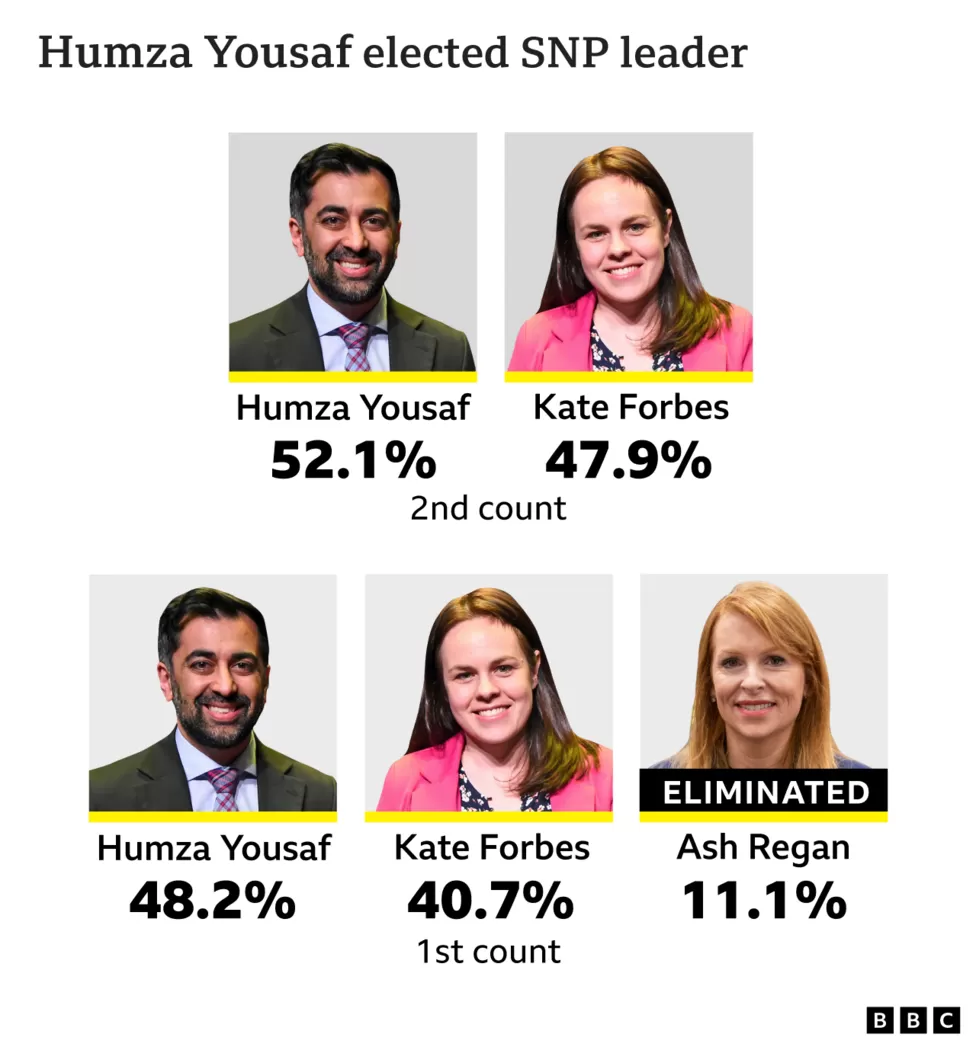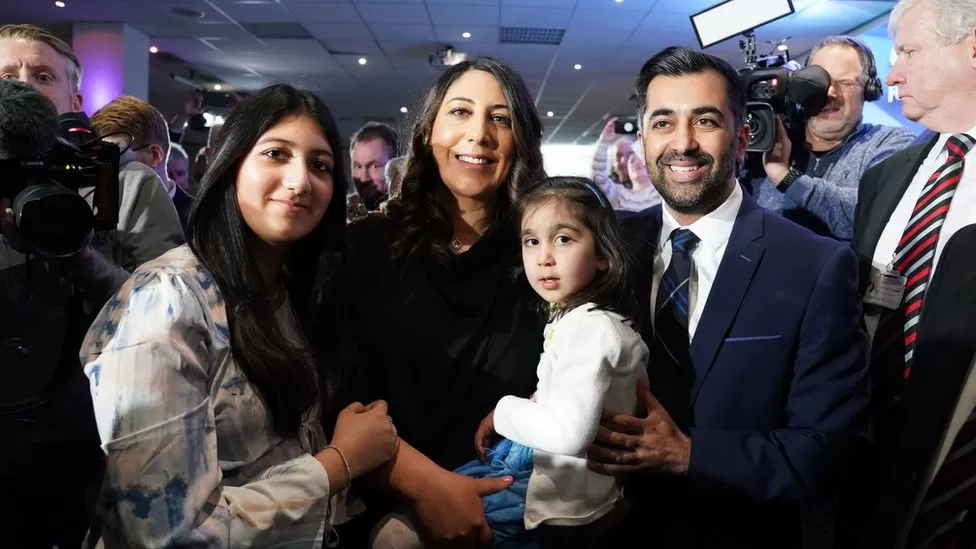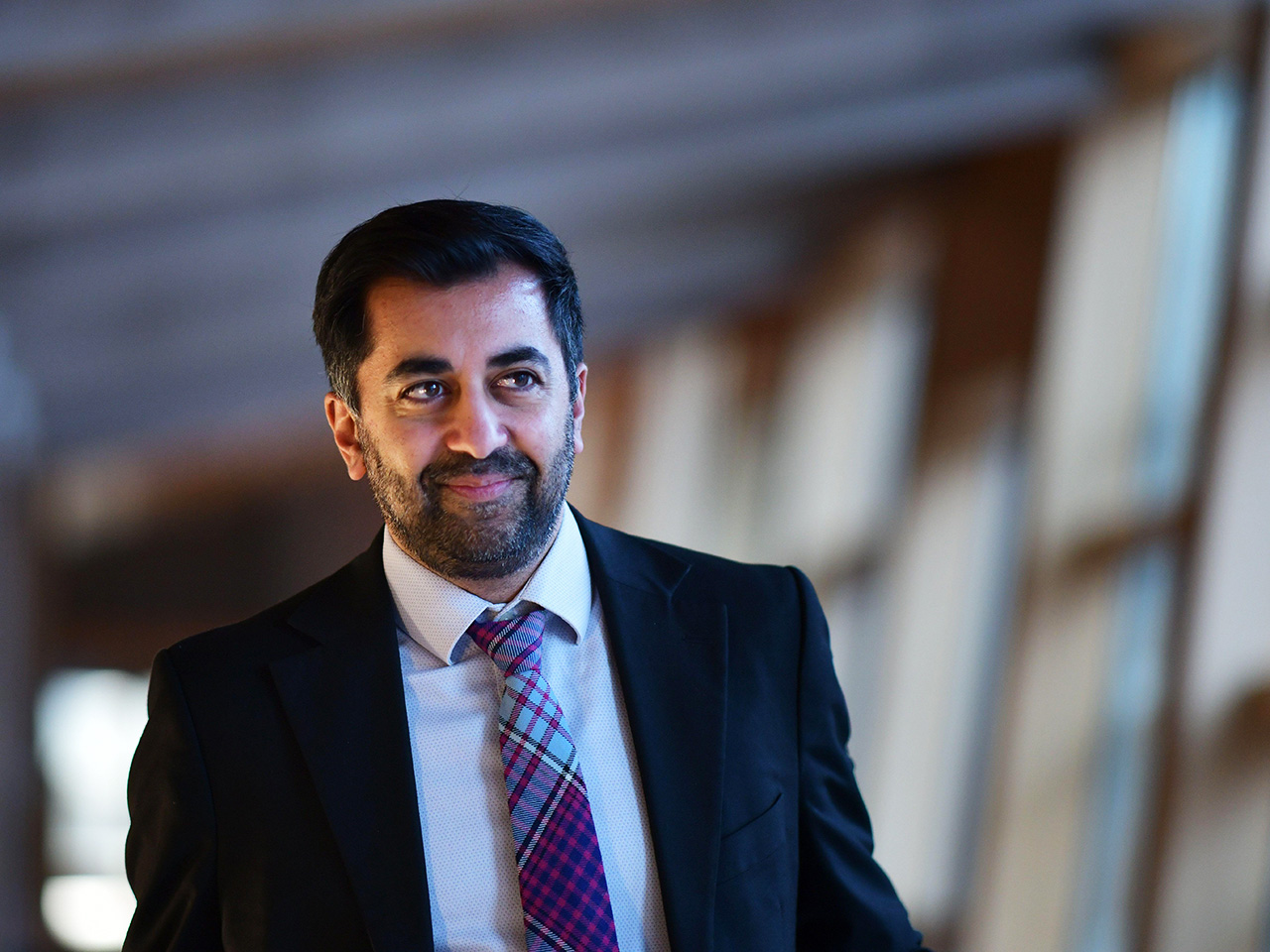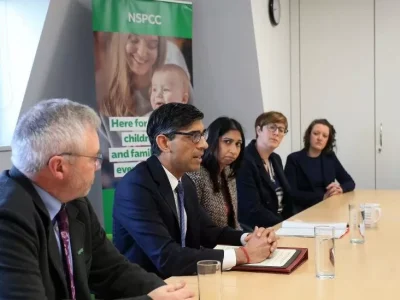Humza Yousaf is to succeed Nicola Sturgeon as SNP leader and Scotland’s first minister after a vote of party members. Mr. Yousaf defeated rivals Kate Forbes and Ash Regan in a leadership contest that exposed deep divisions within the party. The 37-year-old is the first Muslim to lead a major UK party. He is set to be confirmed as the first ethnic minority leader of a devolved government on Tuesday. Mr. Yousaf is currently Scotland’s health secretary and was widely assumed to be Ms. Sturgeon’s preferred successor, although she did not explicitly back any of the candidates in the contest.
The leadership election was decided by the Single Transferable Vote system, with 50,490 of the SNP’s 72,169 members casting a ballot – the vast majority of them online. Mr. Yousaf failed to win a majority in the first round of voting, but won 52.1% of the votes after second preference votes from Ms. Regan, who was eliminated after finishing third, were redistributed. Ms. Forbes came second with 47.9% of the votes when second preferences were included, with Mr. Yousaf receiving 26,032 votes and Ms. Forbes 23,890.
The new SNP leader will face a vote in the Scottish Parliament – which he is certain to win – on Tuesday before becoming Scotland’s sixth first minister. He had been the clear favourite with the bookmakers during the contest, although polling expert Prof Sir John Curtice said ahead of the result that Ms. Forbes appeared to be more popular with Scottish voters as a whole. Ms. Forbes, a member of the evangelical Free Church of Scotland, had been attacked by the SNP hierarchy during the contest over her socially conservative views on issues such as gay marriage, abortion and having children outside of marriage.

Speaking after being confirmed as the new leader at Murrayfield Stadium in Edinburgh, Ms. Yousaf said it would be “the greatest honour and privilege of my life” to be the next first minister. And he called on the party to unite behind him after what has often been a fractious leadership contest. He said independence would be won “on the doorsteps” and pledged to kickstart a grassroots campaign, adding: “We will be the generation to win independence for Scotland”.
Mr. Yousaf added: “In the SNP we are a family. Over the last five weeks we may have been competitors or supporters of different candidates. “We are no longer team Humza, or team Ash, or team Kate, we are one team.” Mr. Yousaf also said his grandparents had arrived in Scotland from Pakistan in the 1960s barely able to speak a word of English, and would not have believed “in their wildest dreams” that their grandson would one day become first minister of Scotland. Ms. Sturgeon, who was Scotland’s longest-serving first minister, announced last month she was stepping down after more than eight years in the job.
She said Mr. Yousaf will be an “outstanding” leader as she congratulated him on his appointment, adding: “I could not be prouder to have him succeed me”. It was the first time the SNP has had a leadership contest since 2004, with Ms. Sturgeon being unopposed when she replaced Alex Salmond in 2014. Mr. Yousaf becomes only its fifth leader since 1979, and will face the task of uniting a party that has dominated Scottish politics in recent years but which has looked deeply divided in the wake of Ms. Sturgeon’s resignation. Ms. Sturgeon’s surprise announcement that she was resigning came just three weeks after she insisted that she had “plenty in the tank” and still believed she would lead Scotland to independence.
Her husband, Peter Murrell, was forced to resign midway through the campaign after it emerged the party’s membership stood at 72,000 rather than the 104,000 it had consistently claimed to have. The party still faces a police probe over the use of £600,000 which was raised by activists who were told it would be ringfenced for a second independence referendum, and questions over why Mr. Murrell gave a SNP a loan of more than £100,000 in June 2021. The SNP and Mr. Murrell both deny they have done anything wrong, with Ms. Sturgeon saying she “can’t recall” when she first learned of her husband’s six-figure loan.
Mr. Yousaf was seen as the “continuity candidate” throughout the campaign – a strong position given Nicola Sturgeon’s enduring popularity with SNP members. He had by far the most endorsements from MSPs and MPs, including most of Ms. Sturgeon’s inner circle. That means he should have a relatively easy time putting together a cabinet and bringing the party back together in parliament. He was also the candidate best-placed to bring the Greens back into government, although they are meeting this afternoon to decide their next steps. But it is inescapable that Mr. Yousaf’s margin of victory was razor-thin. A big, big chunk of the SNP voted for candidates promising change.
So the question now will be the extent to which the “continuity candidate” seeks to differentiate himself from his predecessor’s agenda. Will he forge on with all of her policies, or seek to carve out more of an identity for himself? And given he only just won over half of his own party, will he be able to replicate Ms. Sturgeon’s popularity with the broader electorate when the next election rolls around? Mr. Yousaf had pitched himself to some extent as the “continuity candidate” during the leadership campaign, and was forced to deny claims that the SNP establishment was doing everything it could to ensure he won.
He has often spoken of his admiration for Ms. Sturgeon, but insists that he is “his own man and will do things my own way”. He was on the receiving end of a withering attack from Ms. Forbes in a live STV debate, when she told him: “You were transport minister and the trains were never on time, when you were justice secretary the police were stretched to breaking point, and now as health minister we’ve got record high waiting times”. But Ms. Forbes congratulated him on his success, saying: “Whatever the robust disagreements or frank exchanges of the last few weeks, I am confident we will unite behind Humza as our new party leader in the shared and common objective of independence.”

Ms. Regan, who had always been regarded as the outsider in the contest, tweeted her congratulations to Mr. Yousaf after what she described as a “lively contest” and urged everyone to “get behind Team SNP”. His supporters say Mr. Yousaf is a polished communicator who is best placed to unite the party and maintain the power-sharing agreement with the Scottish Greens – which had been widely expected to collapse if either Ms. Forbes or Ms. Regan had won.
The Scottish Greens said its council had voted unanimously to continue to support the agreement with the SNP and for its MSPs to back Mr. Yousaf in the vote to become the next first minister. Greens co-leader Patrick Harvie said: “This overwhelming endorsement of our arrangement will allow us to continue with the progressive, collaborative politics we know can help deliver a fairer, greener and more equal Scotland for all.” Mr. Yousaf was first elected in 2011 as a regional MSP for Glasgow and was appointed a junior minister the following year, before becoming justice secretary in 2018 and health secretary three years later.
He will immediately face having to make a host of tough decisions, including whether to fight the UK government’s block on Scotland’s gender reforms in the courts – Mr. Yousaf says he wants to but only if the legal advice is that it stands a chance of success – and what to do with other controversial polices inherited from Ms. Sturgeon such as the deposit return scheme and new national care service. The country’s health service has seen record waiting times under Mr. Yousaf’s watch – although he points out that the issue is not unique to Scotland – and he will now also be ultimately responsible for an education system that has so far shown little sign of achieving Ms. Sturgeon’s mission of closing the wide attainment gap between the wealthiest and most deprived pupils.
Downing Street said the prime minister was looking forward to working with Mr. Yousaf, but stressed it will be focused on the “issues that matter to people” such as reducing inflation and dealing with the cost of living crisis rather than independence. Douglas Ross, the leader of the Scottish Conservatives, said he had “serious concerns” about Mr. Yousaf’s ability, adding: “We hope he does not lurch from failure to failure as he did when he was Nicola Sturgeon’s health secretary, justice secretary and transport minister”. Scottish Labour leader Anas Sarwar – who was at school with Mr. Yousaf at the private Hutchesons’ Grammar in Glasgow – said the election of a first minister from an ethnic minority background would be a “significant moment for Scotland”.
But he said Mr. Yousaf was inheriting “the SNP’s woeful record, but he has not inherited Nicola Sturgeon’s mandate”, and called for a Holyrood election to be held. Mr. Ross and Mr. Sarwar will both stand against Mr. Yousaf in the first minister vote in the Scottish Parliament on Tuesday afternoon, as will Liberal Democrat leader Alex Cole-Hamilton – although none of the opposition leaders has any prospect of winning.
![]()






